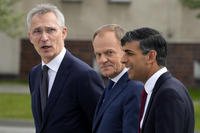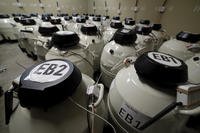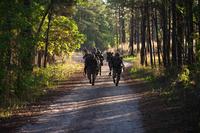It's not just about who calls who. The NSA phone-monitoring project looks at how terrorists place their calls and then applies that model to everyone, to see who else might be a suspect. It's a form of predictive data mining made famous by the notorious Total Information Awareness project. "Armed with details of billions of telephone calls, the National Security Agency used phone records linked to the Sept. 11, 2001, attacks to create a template of how phone activity among terrorists looks," according to USA Today. "The template, officials say, was created from a secret database of phone call records collected by the spy agency. It has been used since 9/11 to identify calling patterns that indicate possible terrorist activity. Among the patterns examined: flurries of calls to U.S. numbers placed immediately after the domestic caller received a call from Pakistan or Afghanistan."
"Armed with details of billions of telephone calls, the National Security Agency used phone records linked to the Sept. 11, 2001, attacks to create a template of how phone activity among terrorists looks," according to USA Today. "The template, officials say, was created from a secret database of phone call records collected by the spy agency. It has been used since 9/11 to identify calling patterns that indicate possible terrorist activity. Among the patterns examined: flurries of calls to U.S. numbers placed immediately after the domestic caller received a call from Pakistan or Afghanistan."
That's new. When the NSA's phone-monitoring programs came to light first in December, then again two weeks ago the projects were said to focus on "social network analysis." Who knows who, in other words. If Osama calls your friend, and he turns around and calls you, the logic goes, you and Osama and probably linked in a common plot. If you don't share anyone in common, you're in the clear.
But, for prominent social network analysts, something didn't quite add up. Building a database of "every call ever made" didn't really help find those personal connections. If anything, the additional records made things even harder.
Today, we learn why everyone's calls had to be in the target set. The NSA wasn't just conducting social network analysis. It was using a more controversial data mining technique, dragged into the popular imagination by Darpa's Total Information Awareness project. It focuses on prediction, not connections.
Under this approach, sophisticated algorithms hunt for patterns of terrorist behavior in information-trails, and then apply those patterns to average citizens, seeing which ones fit. It doesn't matter who you know. It's what you do that gets you in trouble. If you spend money and buy plane tickets like Mohammed Atta did, then maybe you're a terrorist, too. Same goes for the kind, and frequency, of phone calls you make.
Using computer programs, the NSA searches through the database looking for suspicious calling patterns, the officials say. Because of the size of the database, virtually all the analysis is done by computer. Calls coming into the country from Pakistan, Afghanistan or the Middle East, for example, are flagged by NSA computers if they are followed by a flood of calls from the number that received the call to other U.S. numbers.
The spy agency then checks the numbers against databases of phone numbers linked to terrorism, the officials say. Those include numbers found during searches of computers or cellphones that belonged to terrorists.
It is not clear how much terrorist activity, if any, the data collection has helped to find.
(Big ups: Eric)
UPDATE 12:57 PM: "The NSA spying program... is fundamentally a system for identifying criminals by statistical analysis. Americans need to come to grips with whether they approve of this," says Kevin Drum.
Take a different, but equally incendiary example. Suppose that we could semi-reliably create a statistical portrait of child molesters: their age, geographical location, gender, and calling and buying patterns...
Needless to say, the FBI could track these patterns using the same methods as the NSA and then exploit the results to create lists of "possible child molesters." And it might work. But would we be OK with the FBI tapping someone's phone just because they fit a statistical profile? Or staking out their house? Or investigating their friends?
And if we can do it for suspected terrorists and child molesters, how about tax evaders and unlicensed gun owners? ... And if not, why not? After all, if you're not doing anything wrong, why would you object to being investigated?
UPDATE 3:26 PM: Eric makes another great catch, unearthing these nuggets from an interview that First Amendment lawyer Floyd Abrams did on Charlie Rose's show the other night. Abrams, it turns out, was on a privacy panel overseeing TIA:
We basically said if you want to engage in data mining, which we said was a very good way to gather information to fight terrorism, you should go to the FISA court to get permission...
The panel presented its conclusions to Secretary Rumsfeld--who, it might be noted, is also a boss the NSA, since it's a military agency. Rummy thanked them, got some good P.R. and sent them on their way.
Asked by guest host Brian Ross, "Do you feel used?" Floyd said:
[I]t's one thing to be on a commission and then be ignored. That's --that's life. But not even to be told that the government was then engaged in the very activities that we were writing about does seem as if we were being used, yes.








